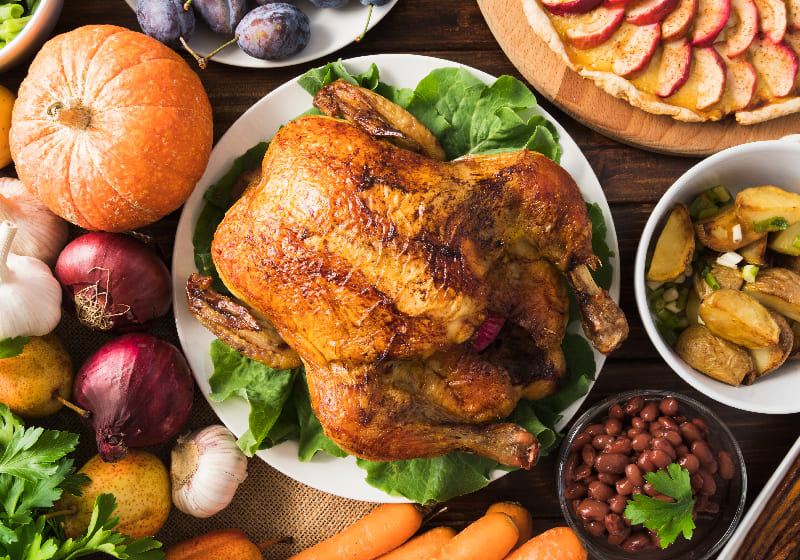Thanksgiving is a wonderful time filled with loving family, good friends and of course, delicious food. But it’s also one of the top holidays for trips to the emergency room. According to the Consumer Product Safety Commission, almost three times as many cooking fires happen Thanksgiving Day than any other time of the year. Here’s what you can do to stay safe while frying your fowl.
Why Fry?
Deep-frying is a popular choice for people that want to get the perfect mix of crisp, golden skin, while also sealing in those savory juices. Soaking the bird in the fryer allows for a little wiggle room, should you overcook your turkey. Plus, the cooking time can be significantly quicker than the traditional oven-baked method. If you aren’t the most experienced of home chefs, then frying might be the right fit for you.
Dangers of Deep-Frying
Like any form of cooking, frying up a turkey isn’t without its own set of hazards. The most common safety issues with frying are:
The good news is that with some extra precautions, you can reduce the chance of injuring yourself.
Take it Outside
If your Thanksgiving holiday is usually overcast and cold, you might be tempted to cook inside your garage or close to the house. However, this puts your home at risk for a fire. Always fry on a flat surface away from your home in case something goes wrong. Keep an eye on the weather as well to find the right timeframe to cook without having to run for cover from rain or snow.
Wipe Off Extra Water
Water and oil don’t mix, and the result can often be deadly. NEVER put a frozen or even slightly damp turkey into a fryer. Set out the bird at least two days ahead of time to completely thaw out. Then, use paper towels to wipe off the excess moisture on both the inside and outside of the turkey. Double-check that no ice is stuck inside the cavity that can later splash down into the fryer.
Don’t Overfill the Pot
A little bit goes a long way, and that’s especially true when it comes to cooking oil. Dripping oil can land on the burner or other components, leading to a fire. You want just enough to submerge the turkey, but not drown it completely. It also helps to buy a slightly smaller turkey, usually between 8-10 pounds to avoid the pot overflowing.
Control the Temp
Superheated oil can become explosive as it sits in the fryer. The optimal temperature you’ll want to maintain while frying is 350 degrees. Consistently monitor the oil’s temperature, or buy a model with a built-in thermometer to easily get an accurate reading.
Watch for Splashes
Oil can dance around and splash up high, causing severe burns on uncovered skin. The best thing you can do is stay away from the pot when you aren’t checking it. When you do get close to the fryer, cover yourself up as much as possible. Wear long sleeves and pants, use mitts, put on an apron and even use eye protection. As you initially lower the turkey into the pot, reduce the heat and do it very slowly. If something doesn’t seem quite right, stop and start the process over.
Stay Alert While Cooking
Always remain vigilant as you fry your turkey, and never leave it unattended. Keep kids and pets inside to prevent the pot getting knocked over or someone accidently burning themself. Additionally, grab an extra fire extinguisher and have your phone ready to dial 9-1-1 for backup assistance.
Schedule your NPI home inspection today.
Find your local inspector today to schedule your full home inspection. Our inspectors are professionally trained to identify any issues or needed repairs on thousands of components of your home, including the roof, foundation, electrical system and more.



